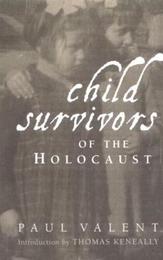
|
Child Survivors of the Holocaust
Paperback
Main Details
| Title |
Child Survivors of the Holocaust
|
| Authors and Contributors |
By (author) Paul Valent
|
|
Foreword by Thomas Keneally
|
| Physical Properties |
| Format:Paperback | | Pages:288 | | Dimensions(mm): Height 229,Width 152 |
|
| Category/Genre | The Holocaust |
|---|
| ISBN/Barcode |
9780415933353
|
| Classifications | Dewey:940.53180922 |
|---|
| Audience | | Tertiary Education (US: College) | | Professional & Vocational | | General | |
|---|
| Illustrations |
ports.
|
|
Publishing Details |
| Publisher |
Taylor & Francis Ltd
|
| Imprint |
Routledge
|
| Publication Date |
21 February 2002 |
| Publication Country |
United Kingdom
|
Description
At the end of the Second World War approximately 1.5 million Jewish children had been killed by the Nazis. In this book, ten child survivors tell their stories. Paul Valent, himself a child survivor and psychiatrist, explores with profound analytical insight the deepest memories of those survivors he interviewed. Their experiences range from living in hiding to physical and sexual abuse. Child Survivors of the Holocaust preserves and integrates the personal narratives and the therapist's perspective in an amazing chronicle. The stories in this book contribute to questions concerning the roots of morality, memory, resilience, and specifc scientific queries of the origins of psychosomatic symptoms, psychiatric illness, and trans-generational transmission of trauma. Child Survivors of the Holocaust speaks to the trauma facing contemporary child victims of abuse worldwide through past narratives of the Holocaust.
Author Biography
Born in Bratislava (now Slovakia) in 1938, Paul Valent survived the Holocaust mainly hidden in Hungary. In 1949, he and his family emigrated to Australia where he later studied medicine and psychiatry. Today, he is a respected psychiatrist and one of the founding traumatologists in Australia. Dr. Valent has treated Holocaust survivors - adults, children, and many second generation survivors, as well as survivors from many other traumas. In 1990, he founded the Child Survivors of the Holocaust griup in Melbourne.
Reviews"Each Holocaust survivor has a different story to tell. The uniqueness of this volume, however, is that the ten survivors whose stories are analyzed here were very young children during the Holocaust, most having been under the age of ten by the end of the war. Their accounts of physical and sexual abuse, as well as the psychological trauma of separation, are rife with raw emotion and offer distressing evidence of the role that childhood trauma can play in adult life. Valent, a noted Australian psychiatrist who is himself a child survivor of the Holocaust, provides professional analysis and commentary for each case, something that is often absent in Holocaust memoirs... "Child Survivors offers an excellent overview that speaks not only to Holocaust victims but to comtemporary traumatic situations. This first U.S. edition is recommended for all academic libraries."-Library Journal ..." "Child Survivors offers an excellent overview that speaks not only to Holocaust victims but to comtemporary traumatic situations. This first U.S. edition is recommended for all academic libraries."-Library Journal "Paul Valent has marshaled the voices of ten such child survivors. Their accounts are full of heartbreaking salient details...fascinating reading and will be seen as possessing universal import.."-Thomas Keneally, author of "Schindler's List ..."this is not a theortical book about trauma and its lifelong effects with occassional case material. On the contrary, this is a book focused on presenting the intertwined past and present of 10 representative adults who experienced varying degrees of exposure to the Holocaust as children....Is Valent's decision to focus the bookprimarily on narrative a sound one? I think so. This way it allows the book to serve audiences who might otherwise overlook it because of its discipline or theoretical bent. In its current form, however, we may ask do we need yet another book about the Holocaust and trauma? After all, there are elegant spokespersons for the Holocaust experience and its impact. My answer here too would be affirmative. Yes, we need to know more, to document more, and to listen more - both in the trauma domain in general, and regarding the Holocaust in particular.."-Death Studies, 2003
|